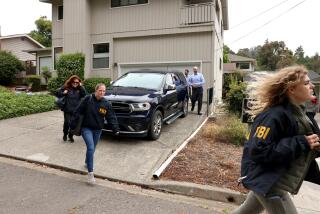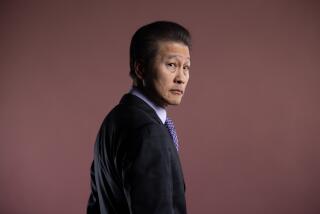Scandal at Odds With Company’s Strict Morals : Taiwan: Founder prided himself on Evergreen’s ethics. California case is said to have deeply shamed him.
- Share via
TAIPEI, Taiwan — On the ground floor of the emerald green 12-story Evergreen Group headquarters here, dozens of primly coiffed female clerks, all dressed in two-tone green jackets, busily take orders for the company’s fleet of 73 ships bound for destinations all over the world, their decks stacked high with the company’s bright green shipping containers.
Evergreen Chairman Y. F. Chang loves all things green. The company logo, a nautical compass, is green. All the telephones in his offices are green. So are the chairs, the carpets and the mainframe computer cases.
If it were not for the conservative gray suits worn by most of the male employees, Evergreen would be in danger of being a monochromatic enterprise. Even the urinals in the employee restrooms are green.
“The chairman likes green because he is from a poor family and for him green stands for hope,” explained Carlos Lin, a company spokesman. “He was a sea captain. At sea, you are always happy to see green.”
After starting in 1968 with just one ship, former ship captain Chang built Evergreen into the largest container shipping company in Asia. Internationally, it is second only in size to the American giant Sea-Land. The company’s success has helped Chang, 66, the son of a ship’s carpenter, amass a personal fortune estimated by Forbes magazine to top $2 billion.
In recent years, as many of Taiwan’s manufacturing industries moved offshore, mostly to China, Evergreen has diversified into steel production--it makes steel for its cargo containers--hotels and commercial aviation. In 1989, Evergreen launched its own international airline, EVA Air, connecting Taipei to international destinations, including Los Angeles and Paris.
As much as any other enterprise here, Evergreen symbolizes the storybook transformation of Taiwan itself, from a sleepy Japanese farming and fishing colony to a modern industrial power in the span of just 40 years.
Chang, a prominent leader in the secretive Chinese religious sect Yiguan Dao, is the Asian version of Horatio Alger--poor Taiwanese boy makes good by stressing hard work and personal morality.
It was all smooth sailing until August, when Evergreen officials admitted making more than $172,000 in illegal campaign contributions to more than 20 California politicians, ranging from Los Angeles City Council candidates to Gov. Pete Wilson and Dianne Feinstein, then a gubernatorial candidate, now U.S. senator. State and city investigators said the San Pedro-based office of an Evergreen subsidiary, Evergreen America Corp., illegally paid employees and their friends to write checks to political candidates as part of a money-laundering scheme to circumvent campaign spending limits.
Although motives for the contributions were not revealed, Evergreen has a large presence in the Port of Los Angeles, as well as pending applications for gates for EVA Air at Los Angeles International Airport. When many of the contributions were made, the firm also had plans for a since-aborted hotel project in Los Angeles’ Little Tokyo.
Figuring prominently in the money-laundering scheme was Evergreen America Vice Chairman William Wang, who has since been transferred from San Pedro to another company office. At least some of the illegal gifts were funneled through the law offices of former Los Angeles City Councilman Art Snyder. Snyder’s wife, Della Wu Snyder, is Wang’s sister-in-law.
On Aug. 24, Evergreen, claiming ignorance of campaign finance laws as the reason for its activities, nevertheless agreed to pay the largest fine of its type in American history--$895,000--for its role in the illegal contributions. In an out-of-court settlement on Nov. 15, Chi May (Marian) Chen, the controller in Snyder’s law office, agreed to pay a $38,000 fine for repeatedly directing illegal contributions to politicians.
The announcement of the unprecedented penalty was major news in Los Angeles but received little attention in the Taiwanese press, traditionally protective of local business interests.
But the California case is said to have deeply shamed Evergreen Chairman Chang, who prides himself on the personal, moral guidance of his business. “It was the saddest news for Evergreen in its history,” said one chagrined employee. “It truly is a pity.”
Approached by The Times, Evergreen senior executives were reluctant to discuss the illegal donations except to refer to the firm’s tautly worded statement, saying: “Evergreen America Corp. accepts full responsibility for its actions. The reimbursements provided in connection with political contributions resulted from decisions made in the San Pedro office of Evergreen America and were made without a full understanding of the campaign finance laws.”
Instead of discussing the money-laundering, company officials pointed to several hundred thousand dollars in charitable and civic donations the company had made. In 1991, for example, Evergreen partially erased a large deficit run up by the Los Angeles Festival by issuing a $300,000 grant to festival organizers.
Chang, officials stressed, recently donated $250,000 to the Seamen’s Church Institute, a New York-based charity affiliated with the Episcopal Church.
In 1990, he was conferred an honorary doctorate by San Francisco State University. Chang, said university President Robert Corrigan at the award ceremony, “is truly a self-made man, who shows what a person of integrity, drive and vision can accomplish in today’s competitive world.”
The California case was not the first time Evergreen had been accused of attempting to sway local politics. In April, 1991, several Taiwanese legislators accused Evergreen of using influence with Taiwan President Lee Teng-hui to obtain land for its fledgling airline at Taipei’s Chiang Kai-shek International Airport.
Enraged by the unsubstantiated accusations, Chang threatened to move the airline’s base to Panama, where the company has a large shipping operation, or to Australia. Chang also said the company would cancel its role in building Taipei’s mass-transit system. The China Post, the English-language Taipei daily, summarized the situation in a front-page headline: “Evergreen Cancels Local Investment, Shocking Industry, Government.”
After he was asked by Taiwan’s finance minister to reconsider, Chang backed off his threats. The allegations of meddling at Chiang Kai-shek Airport soon disappeared.
In the recent California case, investigators with the Los Angeles Ethics Commission and state Fair Political Practices Commission praised Evergreen officials for their cooperation.
A Western diplomatic observer in Taipei said of Evergreen: “The general consensus is that they didn’t know what they were doing in California. They didn’t know that they couldn’t be quite so direct and just give people $5,000 and not expect it to show up as illegal campaign contributions.”
Chang built Evergreen on a strict moral code, based on his religion.
As a prominent elder in Yiguan Dao--a blend of Confucianism, Buddhism and Daoism founded in Shandong on the mainland in the 17th Century--Chang delivers sermons to employees on religious doctrine and morality several times a week in company temples.
About half of the Taiwan-based employees of Evergreen are members of the sect, which was banned as a heretical, superstitious faith in Taiwan until 1987. Yiguan Dao remains banned on the mainland, where its members were accused of collaborating with Japanese occupiers during World War II.
In the most notorious incident of persecution of the Yiguan Dao sect, several hundred members were executed in the northern China port city of Tianjin in 1950, during the “suppression of counter-revolutionaries” campaign ordered by Mao Tse-tung.
Outsiders claim that the discipline and close-knit community provided by Yiguan Dao is the key to Evergreen’s success. Company policy is to recruit employees directly out of high school or university, before they have been tainted by work under other corporate systems. Chang is said to meet and interview every employee in Taiwan before they are hired. Many recruits join the Yiguan Dao faith when they join the company.
In a 1987 interview with the Chinese-language edition of Asiaweek, Chang insisted that employees were not required to attend his sermons.
“I’ve never forced them,” he said. “The only thing I’ve done is to share the doctrines I feel are beneficial in Yiguan Dao.” In the rare interview, Chang said the key to the “spirit” of Evergreen comes from moral education.
Presented with a project proposal by one employee, Chang reportedly answers using moral language. If he approves, he often says: “This is a thing that a person of conscience should do.” If he disapproves, his answer is sometimes: “This contract is wrong. We should apologize.”
Evergreen’s orderly workplaces are enough to make other Asian business leaders green with envy.
At its headquarters, in immaculate, open rooms, department heads sit at desks in front of ranks of clerks and lower-level employees.
During a designated recreation period, employees exercise together beside their desks. Workers are not permitted to smoke in company buildings. Lunches are free, eaten communally in open cafeterias with only a partition separating executives. Twice a day, the Evergreen hymn, with lyrics written by Chang, is played over the public address system.
A writer in the Chinese magazine Heaven and Earth likened Evergreen to a corporate Singapore, a reference to the strict, squeaky-clean and prosperous southeast Asia city-state. Evergreen employees, the writer noted, are well-paid and well-cared-for in the company’s cradle-to-grave program. In a rarity for the shipping business, even sailors aboard container ships are considered full-time employees eligible for full benefits.
In exchange for this paternalism, employees are trained never to criticize or question management. “If somebody does something rude, he will be told ‘bye-bye,’ ” commented Yan Kuoqi, former manager of the public relations department in the Asiaweek article.
More to Read
Inside the business of entertainment
The Wide Shot brings you news, analysis and insights on everything from streaming wars to production — and what it all means for the future.
You may occasionally receive promotional content from the Los Angeles Times.










